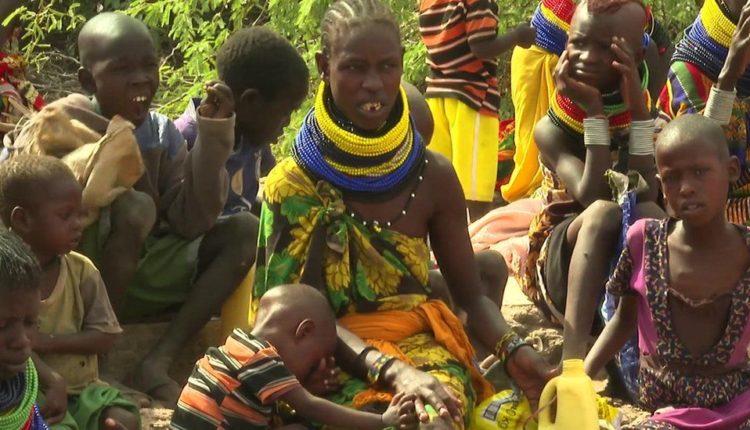Droughts, Covid-19 and the war in Ukraine have led to severe food shortages in the Horn of Africa, with millions of people going hungry. The BBC’s Anne Soy reports from northern Kenya where food is scarce and many are struggling to feed themselves and their families.
At a food distribution centre in the village of Kachoda, a mother grins as she receives some grains and cooking oil – but she is too weak to carry it. The package falls to the ground as she tries to lift it to her head.
But she is among the lucky few who have been chosen to receive the aid – there are hundreds of people gathered outside the food distribution centre, many of them carrying empty sacks.
Hardly any grass can be seen in this dusty and dry area, which is close to the border with Ethiopia and South Sudan.
I’m travelling with Samantha Power, administrator for the US Development Agency (USAid). She has called for more international support “to avoid a hunger catastrophe” in this region.
The US alone cannot meet the demand of people in need of emergency aid in Africa, she says.
Back inside the distribution centre, a committee made up of locals in the community has the tough task of deciding who benefits from the scarce supplies.
Enos Lochul, the chairman, says they prioritise the most vulnerable. But even he has been personally affected.
“I feel really bad, it burns my heart,” he says, explaining that he had been reduced to a beggar after prolonged drought wiped out his only source of livelihood – his livestock.
“My children come to me asking for food, but I have no means of providing. I can’t help but cry. Tears just flow. They ask for school fees, but I have nothing.”
His children have had to drop out of school and his wife has been forced to produce charcoal and fetch firewood to sell.
Ms Power, a former US ambassador to the United Nations, says USAID has made a $200m (£167m) investment in therapeutic supplements for Kenya, where a million children are malnourished, “but more is needed”.
“We’re talking about the massive loss of livelihood and the risk of the massive loss of life,” she says. “And that is why the US has come forward, but the needs here are so much greater than any one country can bear”.
Aid agencies including the World Food Programme say that about 50 million people in the Horn of Africa region – that is Somalia, Djibouti, Ethiopia, Kenya, Uganda, South Sudan and Sudan – could face acute food insecurity this year if they don’t receive urgent food aid.
“The stakes are existential,” Ms Power warns.
Source: BBC


Comments are closed.